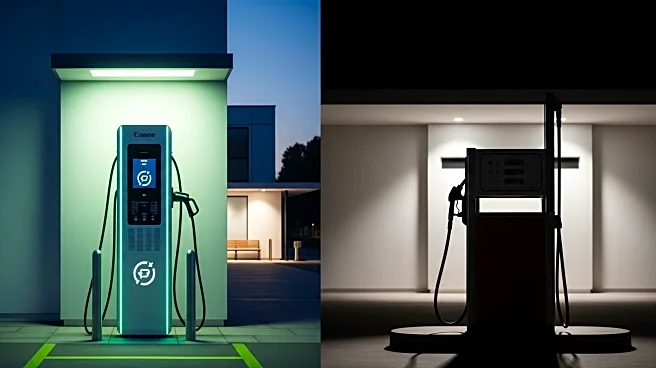What is the story about?
What's Happening?
A recent analysis highlights the varying costs of driving electric vehicles (EVs) compared to gasoline-powered cars across different regions in the United States. The study indicates that while EVs generally offer lower fuel costs, this advantage is highly dependent on local electricity and gasoline prices. In areas where electricity is inexpensive and gasoline prices are high, EVs present a clear economic benefit. Conversely, in regions with high electricity costs and cheaper gasoline, the cost advantage of EVs diminishes. The cost of driving an EV for 100 miles can range from $5.26 to $15.62, depending on charging methods and local rates. Factors such as home charging versus public DC fast charging, and off-peak electricity rates, significantly influence these costs.
Why It's Important?
The findings underscore the complexity of transitioning to electric vehicles in the U.S., where regional disparities in energy costs can affect consumer decisions. This has implications for EV adoption rates, as potential buyers weigh the economic benefits against the practicality of charging infrastructure. States with lower electricity costs and higher gasoline prices, like Washington, offer more incentives for EV adoption, while states like Connecticut, with opposite conditions, may see slower growth. The study also highlights the need for improved public charging infrastructure to support EV owners without home charging capabilities, which could further influence market dynamics and policy decisions.
What's Next?
As the U.S. continues to push for increased EV adoption, policymakers may need to address these regional disparities to ensure equitable access to the benefits of electric vehicles. This could involve incentivizing the development of more affordable and accessible public charging stations, particularly in urban areas where home charging is less feasible. Additionally, there may be a push for utility companies to offer more competitive off-peak electricity rates to encourage EV usage. The ongoing debate over energy policy and infrastructure investment will likely shape the future landscape of EV adoption in the country.
Beyond the Headlines
The broader implications of this analysis touch on environmental and economic policy. Encouraging EV adoption aligns with efforts to reduce carbon emissions and reliance on fossil fuels. However, the economic viability of EVs is closely tied to energy policy and infrastructure development, which requires coordinated efforts between government, industry, and utility providers. The transition to electric vehicles also raises questions about energy equity, as disparities in charging costs could exacerbate existing economic inequalities.

















